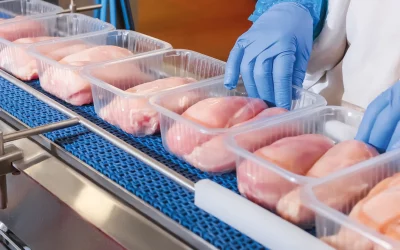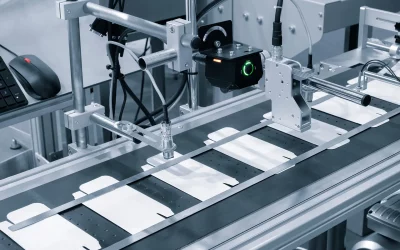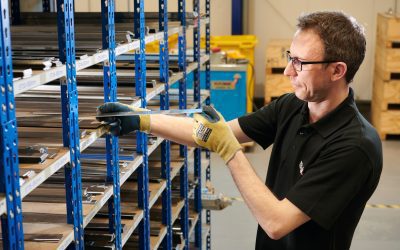Why selecting the right blade material is important
As we mentioned above, selecting the correct material for your machine blades is important – not only because the type of material will impact how long the blade lasts – but also because materials also influence things like cutting quality, cutting consistency, fit, machine reliability, tensile strength, blade harness and more.
So, when it comes to buying machine blades – material matters.
What is tensile strength?
One of the key things to look for when selecting a blade is its tensile strength.
Tensile strength refers to the maximum load that a material can withstand before breaking. Tensile strength is especially important in the context of processing and packaging machinery and plant as machine blades often have to withstand considerable mechanical loads.
As you’ll be aware, blades which are used to cut materials and substances such as meats and fish will find themselves being put under high loads all day, every day.
So, when selecting blades and knives for your machinery and plant, ensure that you buy knives which are designed and manufactured from materials which have a high tensile strength.
Material hardness
Another important thing to consider when selecting machine blades and knives is the hardness of the material they are manufactured from.
As machine blades are used to cut, shred, puncture and grind a wide array of materials, they are subject to a large amount of wear.
This means it’s important that a machine blade is sufficiently hard enough to resist wear; otherwise, you’ll end up with blades that have unacceptably short lifespans.
There are a number of ways to measure the hardness of a material, but one of the most commonly used methods in the machine blade industry is the Rockwell Hardness Scale.
The Rockwell Hardness Scale is a scale based on the indentation hardness of a material. The test involves using an indenter to penetrate a material. The depth of the penetration is then measured. The test is carried out using a major load. The results of this are then compared to a test using a minor load.
Once a material has been subjected to these tests it will then be assigned a value – based on where it sits on the Rockwell Hardness Scale.
There are in fact a number of different Rockwell Hardness Scales, using different loads and types of indentors.
Depending on the type of test the material has undergone, it will be assigned a code e.g. HRA, HRB, HRC etc.
The last letter of these codes indicates the respective Rockwell Hardness Scale.
For machine blades and knives, the Rockwell Hardness C Scale is the most commonly used scale (although the B scale is sometimes used).
Machine blades and knives will generally sit between 40 and 65 on the Rockwell C scale (written as RC40 and RC65 respectively), with a higher number indicating higher hardness.
Don’t just think that harder is better though. For example, a blade which has a Rockwell C scale rating of RC40 will be more durable and better able to withstand impact than a blade which is rated at RC65. This is because, although harder, an RC65 rated blade will be more brittle and more likely to snap if subjected to an abnormal load.
Note – it’s important not to use a Rockwell rating as the sole measure of the suitability of a machine blade. It’s important to consider other factors concerning the blade’s intended use e.g. will it be subject to friction and other forces etc?
Machine blade materials
Having read all of that, you’re probably wondering what the best machine blades materials are. In that case, keep reading as we’ve outlined the most commonly used machine blade materials, detailing their characteristics and properties below.
Tool steel
As the name suggests, tool steel refers to steel which is particularly well suited for tools, cutting tools, dies and more.
Tool steel actually refers to a group of different steels. These include:
- Water-hardening tool steels (which are usually identified using the symbol ‘W’).
- Shock-resisting tool steels (which use the symbol ‘S’).
- Mould steels (‘P’).
- Cold-work steels (including oil-hardening steels ‘O’, medium-alloy air-hardening steels ‘A’, and high-carbon high chromium steels ‘D’).
- Hot-work tool steels (‘H’).
- High-speed steels (including tungsten types ‘T’, and molybdenum types ‘M’).
Tool steels offer a great resistance to wear, and thanks to their high carbon and alloy content, tool steels are ideal for demanding production and packaging environments.
High speed steel (HSS)
One tool steel which is particularly worth paying attention to when selecting machine blades is high-speed steel. Thanks to the properties of HSS, blades made from this material offer the perfect blend of sharpness and longevity.
Stainless steel 420
Based on a modification of stainless steel alloy 410, stainless steel 420 is a hardenable martensitic stainless steel which contains around 12% chromium.
This chromium imparts excellent corrosion resistance to stainless steel 420, which makes it an ideal material for machine blades which are potentially going to be coming into contact with foodstuffs and liquids.
Stainless steel can be hardened to a RC50 hardness rating, making it a tough, durable, long-lasting blade material.
Stainless steel 440
Stainless steel 440 – also known as ‘razor blade steel’ – is a type of hardenable high-carbon stainless steel that has a unique chemical composition. Stainless steel 440 can be hardened to RC58 hardness, making it a tough, durable material for machine blades.
Stainless steel 440 also has excellent corrosion and abrasion resistance and can withstand contact with mild acids, alkalis, foodstuffs, fresh water and air – making it an ideal material for machine blades used in food processing and packaging.
As we often tell customers here at MRMK, blades made from stainless steel 440 will remain rust free for as long as they are maintained. It really is a great machine blade material!
Ceramic
Ceramic is an excellent material for machine blades as it offers excellent cutting performance and low-maintenance. This is because ceramic is an extremely hard material – second only to diamond. This results in blades which retain their edge for far longer than other materials
What’s more, ceramic is non porous, meaning that machine blades made from this material not only stay cleaner for longer, but have impressive corrosion resistance. Ceramic is also a very lightweight material, meaning that machine blades made from this material are easier to handle and to fit and remove from machinery and plant compared to alternatives.
Powdered steel
Powdered steel is one of the latest innovations in metallurgy and knife making. Powdered steel is made by sintering the different metals in alloy into a very fine grain.
These metals are then bonded into a consistent microstructure. This process requires such precision that it has to be undertaken in a laboratory rather than a machine shop or steel mill.
Because of the level of detail that goes into creating powdered steel, it’s possible to create powdered steel machine knives which have the exact mix of elements that you want. This means it’s possible to create machine knives which are incredibly sharp, but also long-lasting. In fact, powdered steel knives are proven to retain their edge far longer than traditional stainless steel alternatives.
However, be aware that the level of work that goes into creating powdered steel is reflected in the price of this material.
MRMK: the home of the very best machine blades
If you’re looking for new blades for your machinery and plant, then explore our range here at MRMK.
With over 800 customers across 50 countries, we’re the go-to designer and manufacturer of the very best machine blades which are engineered to perfectly fit all leading brands of processing and packaging machinery.
Explore MRMK’s range of machine blades today
For the latest machine knife news, advice and information, read the MRMK News and Insights Hub…
A Complete Guide to Industrial Blades and Choosing the Right Steel Grade | Choosing the Right Cutting Tools for Your Food Processing Operations | How to Optimise the Performance of Your Packaging Blades



